Junshi Bios has a successful IPO in Hong Kong stocks or has to fight the PD-1 market
Before the emergence of multinational pharmaceutical companies, after the emergence of domestic giants, Junshi Biological's PD-1 monoclonal antibody products will face enormous competitive pressure.
On December 10, the website of the Hong Kong Stock Exchange announced that Junshi Biological had passed the listing hearing. The company offered shares from December 11 to December 14, and plans to issue 158.9 million shares worldwide, 90% of which are international placements and 10% of which are public offerings. Junshi Bio's issue price of HK$19.38 to HK$20.38 per share, which is expected to be listed on December 24th, is the fifth unprofitable biotech company listed on the Hong Kong stock market.
R&D-type company lost 726 million in 30 months
According to public information, Junshi Bio was established in 2012 as a research and development-oriented high-tech company focusing on the development of monoclonal antibody drugs ("mAb") and other therapeutic protein drugs. Industrialization.
At present, the company has not yet listed its products, that is, it has not received any revenue from the sale of pharmaceutical products. According to the prospectus, in 2016, 2017 and the six months ended June 30, 2018, Junshi Bio's operating income was 3.757 million yuan, 1.148 million yuan and 0 yuan respectively. Revenue from consulting and research services earned on fee-based service contracts.
Although the scale of income is small, with the advancement of research and development, the company's research and development expenditure is still rising. In the first half of 2016 to 2018, Junshi Biotech's R&D expenditure was 122 million yuan, 275 million yuan and 218 million yuan, a total of 615 million yuan, 125 times the scale of the same period.
In the 30 months from 2016 to June this year, Junshi Biological lost a total of 726 million yuan.
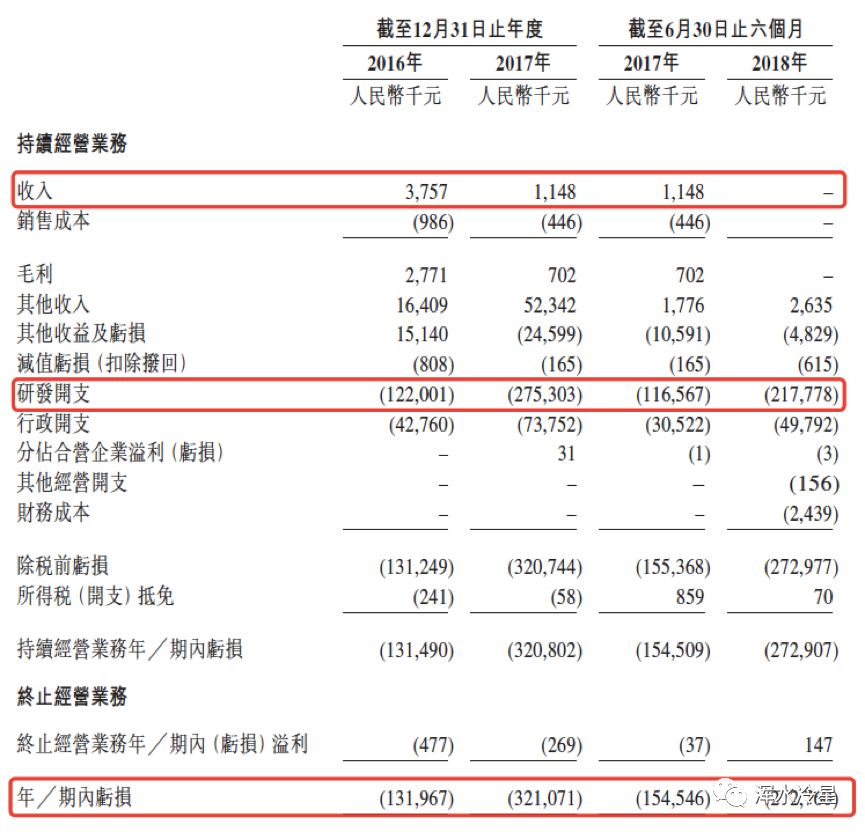
Figure | Junshi Bio 2016-2018 June financial data, source: company prospectus
As a research and development company, Junshi Bio is still in the investment period. From the perspective of R&D pipeline, the company's future profit center is bet on PD-1 monoclonal antibody products.
Multinational pharmaceutical companies in the former domestic leader
On December 4, the official website of the State Drug Administration showed that the review progress of Junshi Biotriprezumab (JS001) was updated to “under approval†and the drug is expected to be the first domestic PD-1 antibody approved for marketing. .
PD-1 antibody is a new drug for tumor immunotherapy. Unlike surgery, chemoradiotherapy and targeted drugs, it does not directly kill cancer cells. Instead, it activates the patient's own immune system to fight cancer. Because it is safer and more effective, immunotherapy represented by PD-1 antibody has become a new direction for cancer treatment, which is why capital is rushing.
The company's PD-1 monoclonal antibody is on the market, and the company will undoubtedly benefit from this. However, at the time of the completion of the building, two dark clouds floated above the sky. A black cloud is a multinational pharmaceutical company, Bristol-Myers Squibb's Opdivo ("O-medicine") and Merck's Keytruda ("K-medicine") have been listed in China at the lowest retail price in the world. In June and July of this year, O medicine and K medicine were approved by the State Food and Drug Administration and entered the Chinese market. The domestic recommended retail price of O medicine 100mg/10ml is 9260 yuan, and according to the US drug pricing website GoodRx, the same specification of O medicine is priced at 2,612.28 US dollars, about RMB 18,028.39, the retail price in China It is only about half of the US region. Similarly, the domestic retail price of K medicine is 17918 yuan / 100 mg, which is only 54% of the United States. From the ultra-low pricing, we can see the expectations of the two companies for the Chinese market, and we are about to seize a place.
Another black cloud is the domestic pharmaceutical giants Hengrui Medicine, Cinda Bio and Baekje Shenzhou also have PD-1 monoclonal antibody products entering the declaration stage, a hard battle is inevitable. Among them, Hengrui Medicine has strong financial strength, carries out relevant clinical trials and explores the most combined drugs, and another PD-L1 monoclonal antibody has also passed the examination and approval. With its strong sales ability, Hengrui is also very easy to let new drugs achieve rapid volume after listing.
Before the emergence of multinational pharmaceutical companies, after the emergence of domestic giants, Junshi Biological's PD-1 monoclonal antibody products will face enormous competitive pressure.
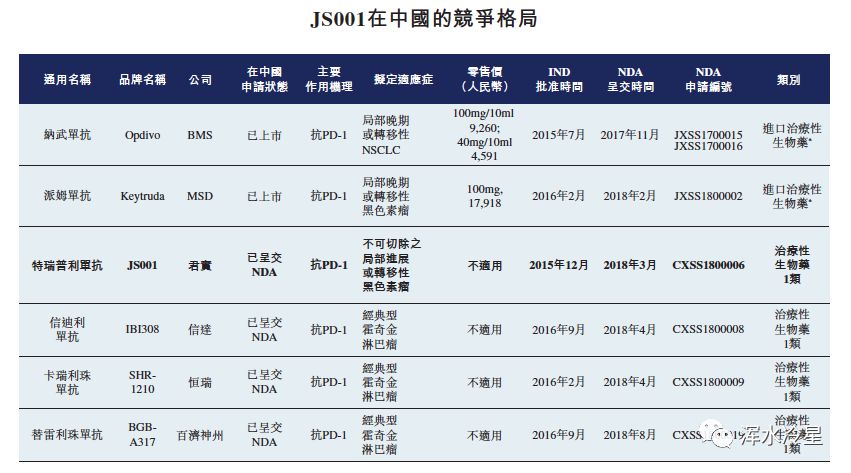
Figure | Junshi Bio-PD-1 monoclonal antibody product competition pattern, source: company prospectus
In addition, this monoclonal antibody product will be the first commercial product of Junshi Bio, and the company's new drug promotion and sales capabilities have yet to be considered.
Doubt about the sales ability of new drugs
For pharmaceutical companies, research and development capabilities are of course a top priority, but sales capabilities cannot be ignored. Junshi Bio is clearly aware of this problem. The company mentioned in its risk factors in the prospectus that it may not be able to establish marketing and sales capabilities, or that it could not reach an agreement with a third party to market and sell the drugs under development.
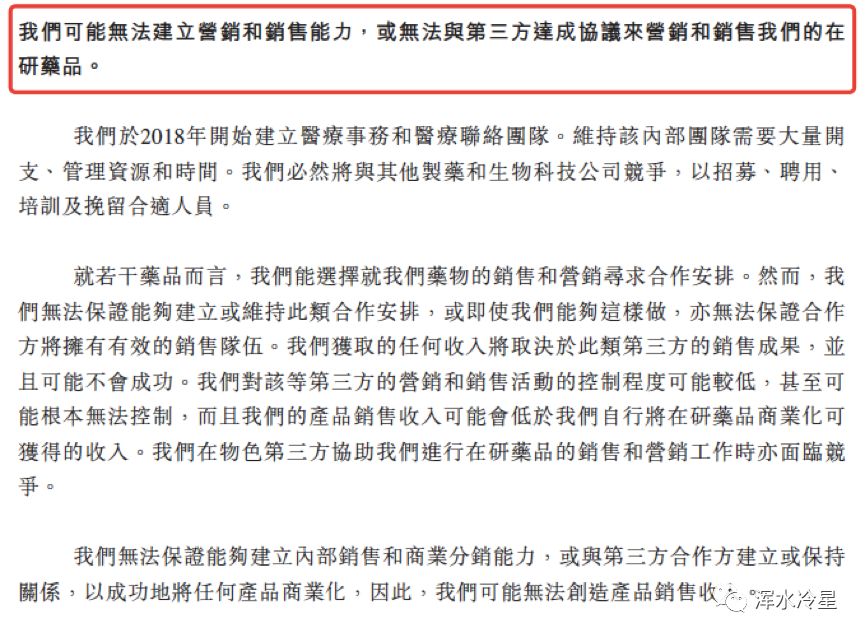
Figure | Junshi Bio refers to the sales ability risk in the prospectus, source: company prospectus
According to the prospectus, the company's response plan is two, one is to recruit, train sales staff, establish an internal team at the cost of a large amount of expenditure, management resources and time; the second is to cooperate with third parties for sales, at the cost of reducing initiative and reducing revenue .
The Associated Press compared the prospectus application version of the prospectus and the post-hearing data set, found that the company recruited a large number of sales staff from April to June this year and cut a large number of production staff. In just two months, Junshi Bio's sales related personnel increased by 56 and production staff decreased by 52. ​​It is obvious that the company is determined to establish its own sales team.
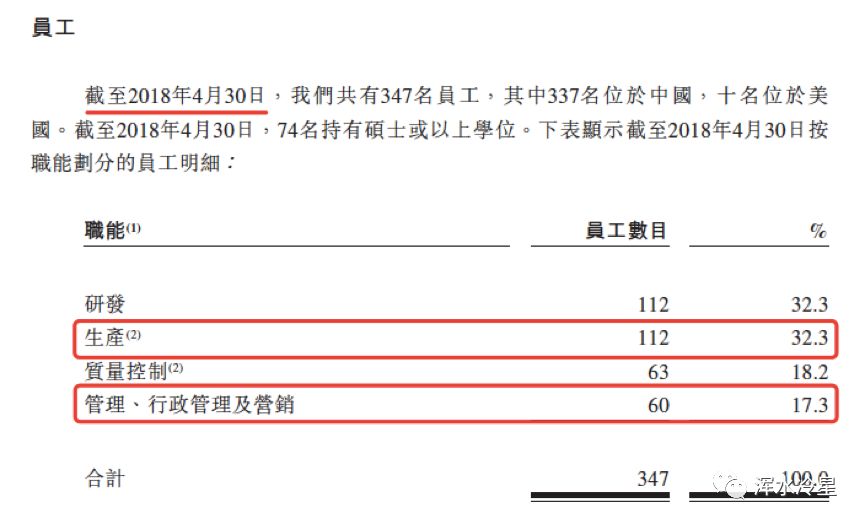
Figure|Jun Shi Bio's employee composition as of April 30 this year, source: company prospectus
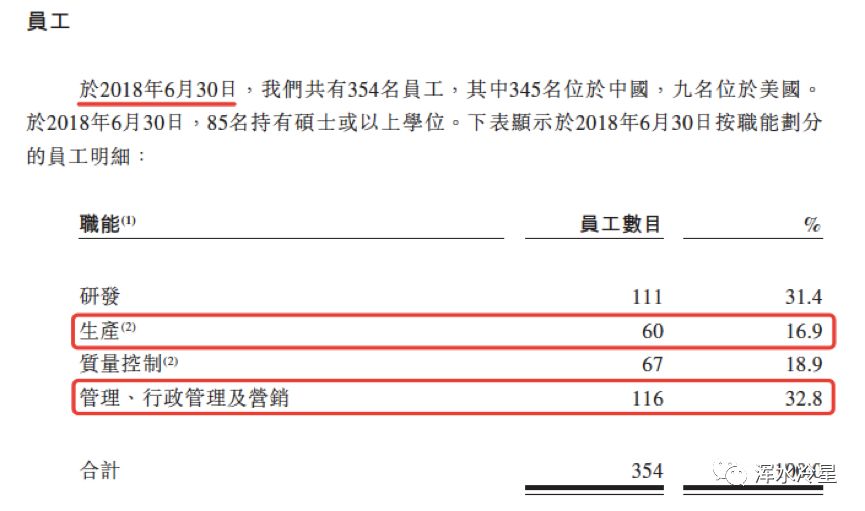
Figure|Jun Shi Bio's employee composition as of June 30 this year, source: company prospectus
However, the newly established sales team needs to run in, and there are many links in the hospital sales. The whole process requires a process, and the company's sales ability needs to be considered.
In addition, it is worth noting that biopharmaceutical stocks listed in Hong Kong have recently been broken. The offer price of Gouai Pharmaceutical (1672.HK), which was listed on August 1, was HK$14, but closed at HK$6.14 on December 11, and the stock price fell more than 56%. The price of Baekje Shenzhou (6160.HK), which went public on August 8, has been falling since its listing. On the 11th, the stock price closed at HK$80.05, which was more than 25% lower than the offer price of HK$108. Hualing Pharmaceutical (2552.HK), which was listed on September 14, although the stock price fell less, but it also failed to break the fate.
Like the above three companies, Junshi Bio is facing the problems of high R&D risk, large capital investment, and no commercial product income. Coupled with the poor environment of Hong Kong stocks and the impact of the policy of the pharmaceutical sector, can Junshi Bio after listing? Break the broken circle, you can only wait and see.
Small Cable Reel,Self Retracting Cable Reel,Auto Rewind Water Hose Reel,Wall Mount Water Hose Reel
NINGBO QIKAI ENVIRONMENTAL TECHNOLOGY CO.,LTD , https://www.cxhosereel.com